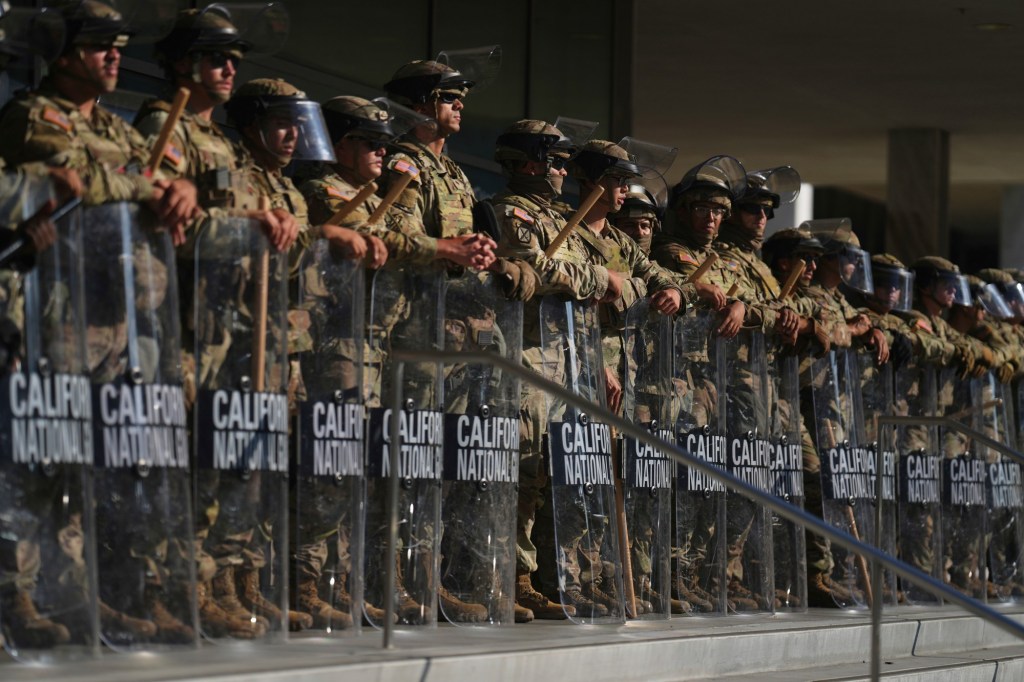
An appeals court issued a ruling on Thursday evening, June 19, allowing President Donald Trump to retain control of National Guard troops he sent to Los Angeles in response to protests over immigration raids.
In a unanimous, 38-page ruling, a three-judge panel of the U.S. Court of Appeals for the Ninth Circuit ruled that conditions in the L.A. area were sufficient for the president to deploy the troops. The judges are two Trump appointees and one of former President Joe Biden.
The unsigned opinion stated: “Affording appropriate deference to the President’s determination, we conclude that he likely acted within his authority in federalizing the National Guard.”
The decision halts a ruling from a lower court judge, U.S. District Judge Charles Breyer, who found Trump acted illegally when he activated the soldiers over opposition from Gov. Gavin Newsom.
In its decision, the court concluded that “it is likely that the President lawfully exercised his statutory authority” in federalizing control of the guard.
It also found that even if the federal government failed to notify the governor of California before federalizing the National Guard as required by law, Newsom had no power to veto the president’s order.
The ruling means control of the California National Guard will stay in federal hands as the lawsuit continues to unfold.
But this is not the end of the case.
Litigation is set to return on Friday to the San Francisco courtroom of Judge Breyer for another hearing. He is weighing whether to issue a more durable preliminary injunction restricting what Trump can do with some 4,000 National Guard troops or 700 active-duty Marines his administration has also deployed into the city.
Breyer’s previously issued temporary restraining order concerned only the National Guard and whether it was lawful for Trump to mobilize them under federal control.
At Friday’s hearing, he is also set to address a state request to limit troops under federal control to guarding federal buildings, and to bar them from accompanying Immigration and Customs Enforcement agents on the workplace raids that sparked the protests.
The court case could have wider implications on the president’s power to deploy soldiers within the United States after Trump directed immigration officials to prioritize deportations from other Democratic-run cities.
Trump earlier this month federalized the California National Guard, deploying more than 4,000 troops to Los Angeles to respond to large-scale demonstrations over immigration enforcement efforts.
The administration made those moves without the consent or request of Newsom; the Democratic governor later sued, requesting a temporary restraining order to halt the National Guard troops from being used to enforce immigration or civil laws in the state.
Breyer granted a restraining order last week, putting Newsom back in control of the Guard and calling Trump’s actions “illegal.”
But lawyers for the Trump administration appealed, and the 9th Circuit Court of Appeals temporarily blocked Breyer’s ruling.
During Tuesday’s hearing before the three-judge panel, Brett Shumate, an attorney for the Trump administration, told the judges that the National Guard is needed to protect federal buildings and agents in Los Angeles amid “ongoing violence.”
Without the Guard, Shumate argued, properties and people would be at risk.
Shumate also argued that the courts do not have a role in reviewing Trump’s order federalizing the National Guard.
Meanwhile, Samuel Harbourt, who represented California, said a further pause of Breyer’s ruling would “profoundly injure the state of California and our nation more generally (because) it would allow defendents to continue diverting thousands of guardsmen away from critical work at the state level, including wildfire prevention and drug interdiction.”
He also argued that continued federalization of the National Guard escalates tensions and risks violence in Los Angeles.
“The president has not even attempted, defendants have made no attempt whatsoever, to provide argument or evidence that they even contemplated more modest measures to the extreme response of calling in the National Guard and militarizing the situation,” Harbourt, a supervising deputy solicitor general for the California Department of Justice, said.
The National Guard hasn’t been activated without a governor’s permission since 1965, when President Lyndon B. Johnson sent troops to protect a civil rights march in Alabama, according to the Brennan Center for Justice.
Tuesday’s appeals hearing was remote and lasted for just over an hour.
Neither Newsom’s office nor L.A. Mayor Karen Bass’ office responded immediately to requests for comment about the latest court ruling.
Protests in Los Angeles have calmed significantly in recent days. On Wednesday, the mayor lifted the dusk-to-dawn curfew she had previously imposed in parts of downtown L.A.
Lawyers for Trump administration, California make their cases for who should control National Guard
Newsom wins legal round over troops, but Trump appeal sends battle to June 17 hearing
The Associated Press and New York Times contributed to this report.
Originally Published:



